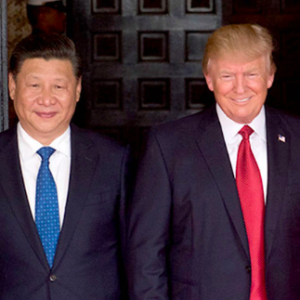The 2020 presidential election is 18 months away. Anything can happen, and quickly. Suppositions today are far from being facts.
But that having been said, the current China trade negotiations (including today’s increase of U.S. tariff rates) are a Big Deal – economically, and potentially politically. Because of them, even though the electoral college Jell-O in the refrigerator is still in its liquid state, it might just be beginning to show signs of solidifying around the edges. Here is why, and how:
There has not been a trade standoff of the magnitude of today’s U.S.-China dispute probably since the Great Depression. (Ouch!) The world’s two largest economies are going head-to-head. And trade is its biggest ever as a share of the global economy.
Trade with China by itself cannot knock the U.S. economy onto its kiesters. But as single influences on the economy go, this one is significant. Economic forecasters say that the tariffs on both sides are hitting U.S. growth directly by one or two-tenths of a point, plus indirectly through the uncertainty on business and consumer confidence.
The tariffs are hurting the economy by raising the prices of our own products. About half of U.S. imports are materials, parts, or tools that we use to make final products, many of which we export. This hurts U.S. manufacturers even selling in the U.S. market in competition with imports from countries other than China. China’s retaliatory tariffs are cutting our sales there, especially of farm products. And tariffs are raising consumer prices, which hurts sales – U.S. retailers lose income if they lose sales of imports, for example.
The negotiations with China could turn in a minute. But today’s scenario is risky. The President himself has said that this is one-on-one between himself and the Chinese premier. The President himself, not his trade negotiators, calls the shots. The President has expressed highly unorthodox views about the economics of trade. The President worries about our bilateral trade deficit with China, while most economists observe that Country A sells to Country B sells to Country C sells to Country A all the time. Thus, the bilateral trade deficit doesn’t matter; it is the overall trade deficit that counts. Economists would hold that the overall deficit grows when a nation spends more and saves less, and the United States is undersaving dangerously. The President has said that he is paying down the nation’s public debt with tariff revenues paid by foreigners, but economists would counter that the tariffs are paid by U.S. consumers and businesses, and are a drop in the bucket compared to the current trillion-dollar annual budget deficits (including the tariffs). In short, if the economics profession has learned from its decades of study and experience, the economic outcome of this trade dispute could be worse than anticipated.
The President is a hard-nosed negotiator, who wants to look strong for his base. But the same is true of the Chinese premier, who cannot look weak before his rivals. Both economies are hurting, and so logic would foresee a quick, mutually beneficial deal. But logic can fail when faced with politics, and the need to save face. Remember World War I?
What does this say about 2020? The 2016 election margin was razor thin. Three industrial and agricultural states (Michigan, Pennsylvania and Wisconsin) swung the electoral college by a combined popular-vote margin of 77,744. That is one football stadium. The President’s job approval is marginal, despite a strong economy. What happens if the trade dispute bites, manufacturers shed jobs, farmers fail, and consumer prices start to rise more rapidly?
Economic models say that elections are swung by GDP growth in the first three quarters (nine months) of an election year. The first three quarters of 2020 are on their way into the oven. Continued stalemate and rising tariffs with China could set the U.S. economy up for a fall.
Again, anything can happen. The U.S. President and the Chinese premier could come to a mutual face-saving agreement before this ink dries. Other, stronger influences could intervene.
But if this two-man test of wills persists, the U.S. economy will suffer. Even then, after the 2020 election, the opinion polls will most likely highlight the economy generally rather than trade with China specifically. But if the economy goes badly and swings the election, we may look back and conclude that it was China trade that swung the economy.

